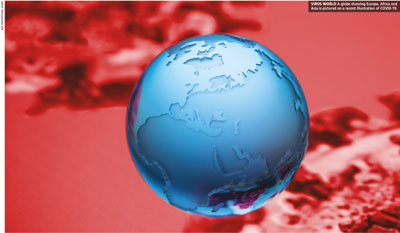EARTH SHUTDOWN
PLANET EARTH
Closed for repairs BY Angelo Fernando

We were warned that an asteroid was heading toward us in April. However, it took a submicroscopic virus to send us into global panic. Let’s face it, neither we nor our elected leaders have been paying much attention to the right things. And so it is with this novel coronavirus. We never saw it coming – or so we assumed.
The truth however, is that many virologists did predict such an event. But in a world that watches out for the dresses that celebrities wear to the Oscars, we missed it. Who listens to the experts when we have so many memes and conspiracy theories in our newsfeed?
Our leaders have been building walls and nuclear warheads – supposedly to defend the country. But all it took was for a microbe practically to close the world for repairs. It has forced people to rethink how Planet Earth’s operating system can function; not only now, in the throes of the pandemic but in the future too.
Most crisis plans anticipate familiar nightmare scenarios – catastrophic events such as earthquakes, nuclear accidents, terrorism, gun violence or some massive environmental event such as a tsunami. Now we are told that we’d better prepare ourselves for our new reality, which is a recurring viral threat that disrupts every industry in real time.
Let’s look at six large areas going forward.
EDUCATION Distance learning is no longer an option and has become the only way to go to school during a crisis. Size doesn’t matter. Whether it’s a Montessori or Harvard University, the challenge is to adopt new platforms and engagement tools. Overnight, Zoom, Google Hangouts and Cisco Webex became the ‘go to’ technologies.
Many years ago, after a serious lockdown, we were given an emergency plastic bin with medical supplies and snacks – the bin was to double up as a toilet as well. Schools must now rethink emergency kits to include virtual technologies that will need to be invented.
ELECTIONS Polling stations won’t work if poll workers are scared or too sick to show up. Campaigning means very little if the audience is absent or invisible. In the US, at the very height of the presidential campaign in March, rhetoric took a different turn for the two Democratic contenders left standing.
Those running for city council posts, governors’ races or Congress will realise that the ‘beauty pageant’ factor will mean very little because voters have begun looking for different traits such as crisis management when marking the ballot.
RETAIL Typically, we think of bricks and mortar stores to purchase food, clothing and hardware. But so too are barbershops, childcare facilities, gyms, pharmacies and petrol stations. These service providers underpin our economy even though many of their services can’t be provided online.
Restaurants could take orders online and deliver or have food picked up at the door. But how would future restaurants be designed if physical distancing inside has to be the norm? Could cities require that there be ‘zoned in’ spaces that could quickly be secured, disinfected and accessed safely in an emergency?
TRANSPORTATION The virus hitchhiked across the world thanks to an increase in air travel. As airlines drastically slash flights, they must surely be planning for similar future shutdowns. With fleet reduction, could international travel become more expensive and increasingly inconvenient?
How would a patdown in an airport security line be handled? On the ground, Uber, Lyft and PickMe drivers must learn to supplement their livelihoods in a world where ridesharers want to stay six feet away from each other. And can seating in aeroplanes, trains and buses be redesigned?
RELIGION Social interaction is a given in temples, synagogues, kovils, mosques and churches. How would those who are drawn to the bricks and mortar sites come together as a community when the doors are shut?
For years, religious leaders have told us that the church is more than the building. Once we go back to religious practices that are not livestreamed, would we rethink processions, funerals and pilgrimages where thousands gather? Would there be congregations when we can’t always congregate?
HEALTHCARE “Ventilators are to this war what missiles were to World War II,” says New York Governor Andrew Cuomo. The military metaphor is appropriate as field hospitals have sprung up in Central Park with refrigerated trucks serving as makeshift morgues. Health insurance will have to change to support compulsory vaccinations and testing. Medical staffing could experience a huge demand.
Companies will need to learn to repurpose their businesses at short notice. Carmakers are producing ventilators; hotels are being turned into makeshift wards; and startup labs are fast tracking innovative diagnostic tools, anti-pathogen fabrics and disinfectants.
Instead of being gripped by panic, the world has woken up to the urgency of rethinking how its operating system could be fixed – fast.




